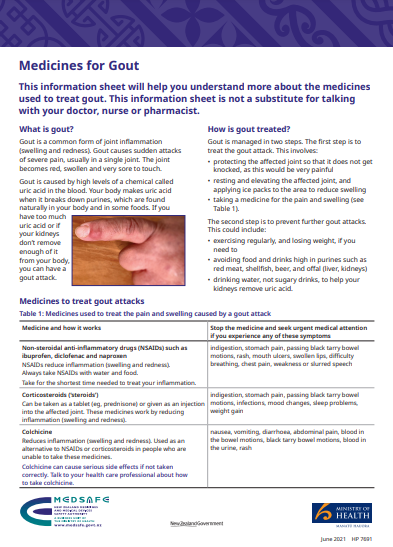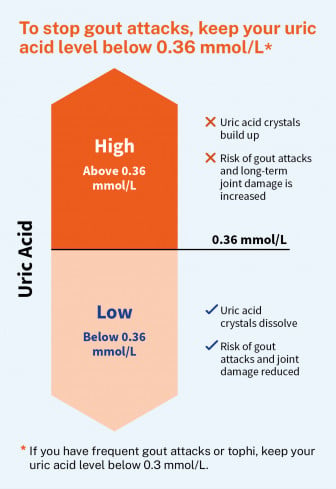Medicines to treat and prevent gout
Key points about gout medicines
- Medicines used for gout can be used to treat an attack of gout, or to prevent further attacks.
- The choice of medicine depends on other health conditions you may have, including kidney problems, heart failure, diabetes, stomach ulcers and other medicines you're taking.
- Find out more about gout medicines and how they work.

Gout attacks happen when there’s too much uric acid in your blood
- Your kidneys usually filter extra uric acid into your urine (pee). If your body makes too much uric acid or your kidneys can’t filter it, the excess builds up.
- The extra uric acid can turn into crystals in your joints, causing pain and swelling. This is called a gout attack or flare. Treatment of a gout attack, includes medicines to help with pain and swelling.
- Over time, the build up of uric acid can cause repeated gout attacks and damage to your joints, bones and kidneys.
- With each new attack, the size and number of crystals grow and can sometimes be seen as lumps under the skin (tophi). Learn more about gout.
- Gout attacks can be prevented with medicines that reduce your uric acid levels.
To reduce gout attacks, keep your uric acid level below 0.36 mmol/L
- When your uric acid is below 0.36 mmol/L, no new crystals can form and crystals that are already in your joints can start to dissolve.
- Preventative medicines (eg, allopurinol) can reduce the amount of uric acid your body makes and reduce the risk of gout attacks and joint damage.
- If you already have tophi, the goal is to get to a uric acid level below 0.3 mmol/L.
- Uric acid levels can be checked with a blood test, which can be done at a blood lab, at your doctors clinic or at some pharmacies.
Gout attacks can be prevented with medicines that reduce uric acid levels, eg, allopurinol, febuxostat or probenecid. This is also called urate lowering therapy.
- To keep your uric acid level below 0.36 mmol/L, you'll need to keep taking these preventive medicines every day, even during a gout attack.
- If you stop taking it, even for a few days, your uric acid levels will rise and crystals will form. This can cause a gout attack and joint damage.
- It may take 6 to 12 months of taking preventive medicines every day before your uric acid level is below 0.36 mmol/L.
Medicines that limit the amount of uric acid your body makes
- Examples: allopurinol and febuxostat.
- Doses are started low and increased until your uric acid level comes down to 0.36 mmol/L.
- It’s common to have gout attacks when you start treatment with allopurinol or febuxostat.
- To help you manage any gout attacks, you may be prescribed preventive pain relief (eg, low doses of colchicine, nonsteroidal anti-inflammatory drugs (NSAIDs) or prednisone) for up to 6 months.
Medicines that help remove uric acid from your body
- Example: probenecid.
- Probenecid improves your kidneys' ability to remove uric acid from your body.
- It's usually used if you can't take allopurinol or febuxostat.
- You need to have good kidney function if you're taking probenecid.
Gout attacks are also called flares. They cause severe pain, redness and swelling of 1 or more joints. It usually happens in your big toe but can affect any joint
To manage the pain, rest the affected joint and use ice packs to reduce swelling. There are also medicines that can help to manage the pain and swelling. The choice of medicine depends on other health conditions you may (eg, kidney problems, heart failure, diabetes, stomach ulcers) and other medicines you're taking.
Medicines you may be prescribed are:
Note: If treatment is started straight away, relief from symptoms often occurs within 24 hours. Medicines for pain relief and swelling shouldn't be taken long-term.
Non-steroidal anti-inflammatory drugs (NSAIDs)
NSAIDs include naproxen, diclofenac (Voltaren) and ibuprofen. They can reduce pain, swelling and redness quickly. Use the lowest dose for the shortest time – stop taking them once the pain and swelling has stopped.
- NSAIDs shouldn't be used if you have heart failure, stomach ulcers or kidney problems and if you're taking certain medicines. Read more about when you should not take NSAIDs. Always check with your healthcare provider if NSAIDs are safe for you.
- NSAIDs can cause tummy problems (eg, indigestion and heartburn) so take them with food. Read more about NSAIDs.
- Note: Aspirin is not recommended for pain relief for gout as it can make your symptoms worse. But if you are taking low-dose aspirin for a heart condition, continue taking it. Low dose aspirin doesn't significantly increase your uric acid levels.
Prednisone
- Your doctor may prescribe a short course of prednisone tablets to reduce the pain and swelling.
- Prednisone tablets are usually taken once daily until the attack has settled, then the dose is reduced over 1 to 2 weeks before stopping.
- Take prednisone tablets with food to reduce tummy upset.
- Prednisone tablets are best taken in the morning because they can sleep problems. Read more about prednisone.
Colchicine
- Colchicine is only used if you can't take NSAIDs or prednisone, because it can make you feel sick and cause diarrhoea (runny poo).
- It's important to take the correct dose as there isn’t a big difference between a safe dose of colchicine and a harmful dose. Read more about taking colchicine safely.
As part of rongoā Māori, rongoā rākau (traditional plant remedy) may be used to help treat flare-ups of gout. It may be used as a paste applied to your skin or the plant can be added to bathwater. If you're planning to take any oral herbal medicine, your doctor or pharmacist can check to see if it's safe to take with your other medicines.
Here are 3 videos about gout medicines from a series created by the Health Navigator Charitable Trust.
Video: Gout medicines
Video: Deciding to take allopurinol
Video: Starting on allopurinol
Taking medicines is an important part of treating and preventing gout. In this video, Healthify He Puna Waiora consumer representative and cultural advisor Merle Samuels shares tips for managing your medicines.
Video: Understanding your medicines
(Healthify He Puna Waiora, NZ, 2020)
Gout is a long-term condition which means that it is ongoing and you will need to take medicines every day for many years to stay well. Many people find this challenging. In this video Merle discusses how she looks after herself with her long-term conditions.
Video: Managing your health conditions
(Healthify He Puna Waiora, NZ, 2019)
Gout Guide(external link) Tools and resources to improve gout outcomes Healthify He Puna Waiora, NZ, 2024
Medicines for gout(external link) Medsafe, NZ te reo Māori(external link), Samoan(external link)
Gout(external link) Arthritis New Zealand
References
- Drugs used in rheumatic diseases and gout(external link) NZ Formulary(external link)
- Managing gout in primary care(external link) BPAC, NZ, 2021
Brochures

Medsafe, NZ, 2021
English, te reo Māori, Samoan

Medicines and side effects
Healthify He Puna Waiora, NZ, 2024

Health Quality and Safety Commission, NZ, 2019 English, te reo Māori
Credits: Sandra Ponen, Pharmacist, Healthify He Puna Waiora. Healthify is brought to you by Health Navigator Charitable Trust.
Reviewed by: Angela Lambie, Pharmacist, Auckland
Last reviewed:






